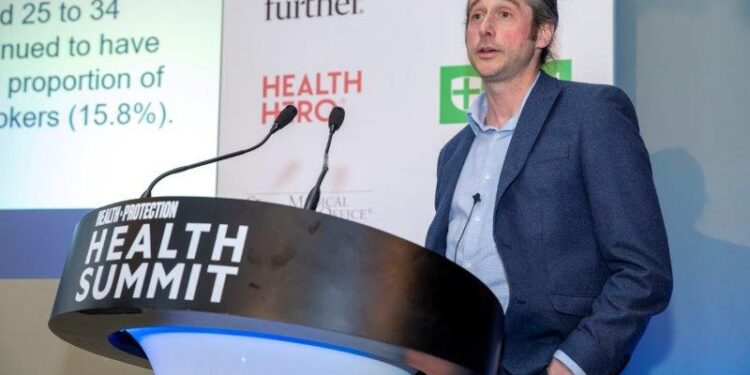As suicides, drug and alcohol-related deaths increase among the middle aged, the Office for National Statistics (ONS) has revealed it is analysing data around barriers to accessing mental health services.
Presenting the findings at Health & Protection’s Health Summit, ONS head of health analysis James Tucker revealed that since 2007 there has been a slight increase in number of suicides among the UK population.
The data also revealed that in the 1980s suicides were concentrated in older age groups but now that trend had moved towards middle aged men.
And while men account for 75% of suicides, there has also been an increase among young women and a North/South divide has emerged with the North East posting the highest suicide rates and London the lowest.
But Tucker (pictured) also described a “shocking” rise in drug related deaths over the last decade, with deaths from cocaine increasing seven fold – particularly again among the middle aged – people born in the 1970s.
And with the onset of the pandemic Tucker also highlighted a pronounced rise in alcohol deaths among both men and women, who were typically aged in their 50s and had developed liver conditions.
When asked about a notable uptick in mental health concerns for younger people becoming a growing concern as they become middle aged, Tucker revealed fewer people were seeking medical help.
“We do have some information from a system called Improving Access to Psychological Therapies as well which we’re going to be doing some analysis on and understanding how able people are to access help for this,” he added.
“Because obviously if you don’t get the help, then yes, you will perhaps see problems persisting later in life.”
Health perceptions improving
While alcohol-related deaths had become more of a concern over the pandemic, how people perceived their own health actually improved in 2021, according to fellow presenter Julie Stanborough, deputy director for health and life events at the ONS.
Stanborough revealed one of the questions asked by the ONS in its 2021 Census was around general health where respondents rate themselves from having very good health down to having very poor health.
“Interestingly we saw in 2021 a higher proportion of people saying their health was very good and that was probably quite surprising because we were at the height of a pandemic at the time,” Stanborough said.
“That’s why it’s important to understand and interpret statistics and understand the context in which these questions were asked.
“At that time we were in a lockdown. People perhaps weren’t commuting to work. We were told we should have an hour’s exercise every day.
“People had more time to cook their meals at home and that might have an impact. People were also looking around at other people – knowing we were in a pandemic, people were dying – and they thought: ‘Actually my health is pretty good’.”






